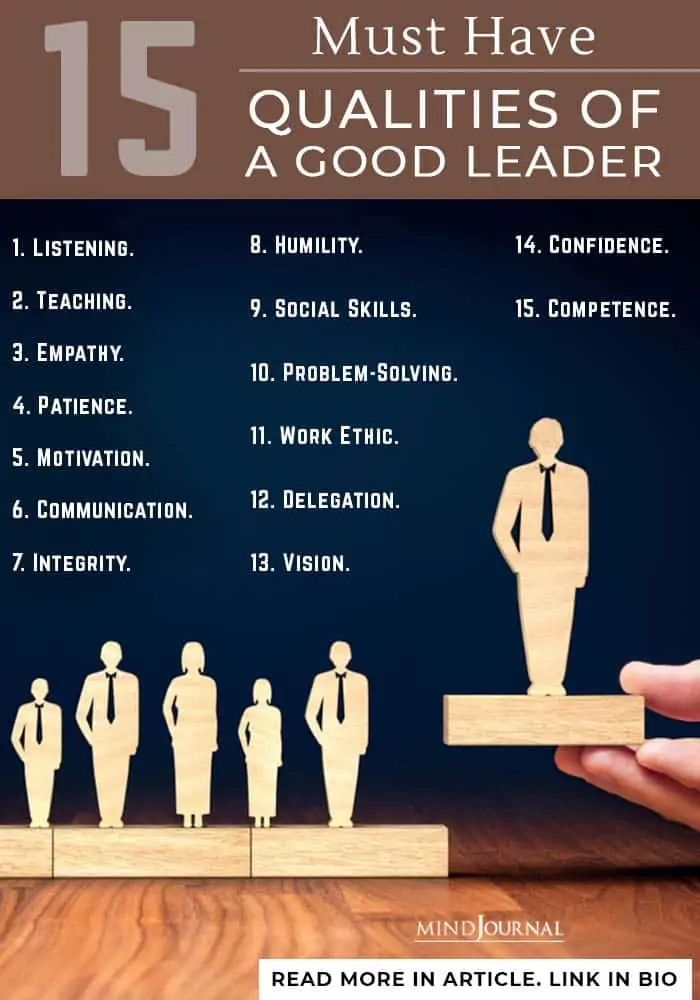Being a good leader is sometimes easier said than done, and if you want to be one, then you need to imbibe some valuable qualities in yourself to ensure that.
Think of a great leader, either on the public stage or in your personal life. Why do they stand out to you? It should be fairly easy to come up with qualities that make them good leaders.
Now think about someone who isn’t a great leader. The qualities you just named—honesty, integrity, positivity—perhaps don’t apply to this person.
While skill, knowledge, and talent are necessary to climb to the top, the best leaders exhibit soft skills that help them lead, not just oversee. They’re the people you want to not just work for but also emulate in your leadership journey.
How can you become a great leader yourself? This list contains 15 must-have qualities of a good leader that you should be working on right now.
Here Are 15 Must-Have Qualities Of A Good Leader

1. Listening.
Too many people in this world talk and talk, hardly catching their breath. They sometimes hear others but only long enough to come up with a reply.
Because they tend to be busy people, leaders are susceptible to this. It can be difficult to listen to others when you’re in a higher position. True leaders are willing to listen to smart people no matter their job title.
Listening also helps solve problems instead of making them worse. Listening to employees when they express concerns can help you address them instead of fabricating an apology that doesn’t help anyone.
2. Teaching.
Poor leaders default to punishments when mistakes are made. But this does little to help development and a lot to hurt morale.
Good leaders are teachers. In a 10-year study, a Dartmouth professor found that one of the biggest things that separated star managers from their peers was their emphasis on training.[1]
Turning a mistake into a teaching experience generates growth. While errors certainly need to be dealt with, helping others understand their mistakes and make necessary changes is a much better way to build a deal.
Related: Top 10 Bad Leadership Behaviors That Destroy Organisations
3. Empathy.
Empathy is the ability to put yourself into someone else’s shoes. It is one of the most important yet overlooked qualities of a good leader.
Empathetic leaders can consider decisions from multiple standpoints, enabling them to make better decisions than those who can’t see things from others’ perspectives.
Leaders with empathy naturally attract talented team members. Everyone wants to work for someone who’ll be supportive and helpful when things don’t go their way. Even when hard decisions have to be made, empathetic leaders ensure nobody feels left out in the cold.
To check your empathy, ask your team. According to an annual research study of small business leaders, just 36% of respondents felt they’re taking “very good” care of their employees—but nearly half of their employees said they felt well cared for.[2] If others think you’re empathetic, then you probably are.
4. Patience.
The best decisions are not made in haste. A good leader takes the time to think things through before coming to a decision. A leader that loses their temper will make a bad situation worse almost every time.
To practice patience:
- Force yourself to wait. Rather than ordering groceries, go to the store and wait in line. Instead of choosing the restaurant with no line in the drive-thru, go to the one you want—which others probably like as well—and wait for a better meal.
- Meditate. When you’re feeling overwhelmed, find a quiet space. Simply sit and listen to your breaths. Notice how much more at ease you’ll feel.
- Start a long-term project. Great accomplishments don’t happen overnight. Begin a passion project that you can watch grow over time.
- Invest in someone new. Nobody becomes a star employee overnight. For the next open position on your team, choose someone promising you think you can bring out the best in. Enjoy the process of helping them grow.
5. Motivation.
Employees are rarely as motivated as managers and business owners. Oftentimes, they need encouragement from their leaders to help them keep going. Otherwise, the stress of work can result in burnout—something more than three-quarters of employees says they struggle with.[3]
A good leader can keep their team motivated even during the toughest of times. They do this by first keeping themselves motivated and then transferring that energy to others. Inspiring motivation in others requires mental endurance, maturity, and poise.
6. Communication.
Some leaders are great at one-on-one communication, while others specialize in public appearances. Different situations call for expertise in different types of communication, but all good leaders have mastered at least one of them.
Communication can be broken down into the following categories:
- Written communication. Explaining details over email or in Slack is an important skill for managers.
- Public speaking. Being able to speak to a large group is crucial for team meetings, training, and more.
- One-on-one conversation. How do you handle one-on-one talks with your employees and colleagues? This is where leaders set the tone.
- Nonverbal communication. Nonverbal communication includes facial expressions and body language. Often, this form of communication speaks more loudly than any word or phrase ever could.[4]
Communication is how leaders do everything from delegating tasks to inspiring their team members. Whether you want to manage or develop organizational strategy, focus on the form most relevant to you.
7. Integrity.
Leaders are influencers. Integrity is one of the vital qualities of a good leader. It can be tempting to use that power for personal gain, but no great team is ever built by a selfish or dishonest leader. A good leader has integrity, meaning they exert control only in ways that benefit the wider team.
People stick by leaders with integrity in good times and bad. They trust the leader to do everything in their power to improve the team’s situation. These leaders understand that trust is tough to build and exceedingly easy to break.
Related: 9 Reasons Why Introverts Make Great Leaders, According To Science
8. Humility.
For multiple reasons, humble leaders are hard to come by.[5] All too often, those at the top of the corporate ladder use their standing to degrade others or to boost themselves higher.
Leaders with humility recognize that everyone has an important role to play in the team’s success. They acknowledge their shortcomings, own up to their mistakes, and do what is necessary to make amends. Humble leaders see even the lowest person on the totem pole as their equal, not as an underling who does their bidding.
9. Social Skills.
Because management is a key part of leadership, leaders interact with others frequently. Everywhere from team meetings to corporate boardrooms to casual lunches, great leaders can navigate social settings with grace.
Although everyone has their quirks, a proper leader needs to understand how to act in front of groups of people. There’s a delicate balance between professional and casual behavior that leaders need to master.
10. Problem-Solving.
Rather than constantly looking to others for a solution, leaders must be able to solve problems as they arise. This is one of the most important qualities of a good leader. Good leaders recognize they won’t find the right solution every time, but any answer is better than ignoring the problem altogether.
Problem-solving requires hard skills related to the job at hand as well as critical thinking. This is one reason leaders are often chosen for their years in the field: The more experience they have in solving similar issues, the more likely they’ll be able to address new ones well.
11. Work Ethic.
While it takes a lot of hard work and perseverance to make it to a leadership position, leaders can’t kick back once they’re in the role. Good leaders are willing to put in the hours necessary to get the job done, even if their employees are at home enjoying the evening.
With that said, good leaders know not to work themselves into the ground. They find a happy medium between grinding it out and giving themselves breaks. In fact, research suggests people who take breaks periodically are more productive than those who try to power through.[6]
12. Delegation.
Leaders can’t be expected to do everything on their own. By delegating tasks to others on their team, good leaders disperse the workload across the organization. Effective delegation is one of the must-have qualities of a good leader.
There is such a thing as too much delegation. Leaders shouldn’t be afraid to take on tougher projects that require a manager’s touch. However, they should look for opportunities for others to grow by assigning them projects that stretch their capacities.
Related: 10 Highly Toxic Traits Of Awful Leaders
13. Vision.
Good leaders have direction. They help others move toward that goal through personal or professional development. To check whether the team is on track to fulfill that vision, they identify key performance indicators.
A leader must also be able to paint a picture for others, tying into the motivation and communication aspects of leadership. If others can’t see their vision, leaders will struggle to inspire them to work toward it.
14. Confidence.
Leaders have to make tough decisions. When they make those choices, they must be comfortable with the pros and cons. Wavering signals to others that the leader hasn’t done his or her homework.
Beware that confidence can be misplaced. Simply charging ahead with gusto does not make a good leader. Leaders must ground their confidence in data and empathy, not their egos.
15. Competence.
Great leaders are more than just figureheads. Their capabilities are evident to everyone around them. That isn’t to say that they are perfect at everything they do, but rather that they’re skilled in the areas they need to be to make good decisions for the team.
Final Thoughts
A good leader makes all the difference on a team. It isn’t easy to develop and master these qualities of a good leader, but being in charge is rarely easy. Do a self-audit: Which of these qualities do you need to work on to be the best leader you can be?
References:
[1] Harvard Business Review: The Best Leaders Are Great Teachers [2] OnPay: The State of Small Businesses in 2020 [3] Deloitte: Workplace Burnout Survey [4] Physician Leaders: Leadership and the Language of Nonverbal Communication [5] Forbes: Why Humble Leaders Are Rare [6] Calendar: Can Frequent Breaks Make You More Productive?
Written By Kimberly Zhang Originally Appeared In Lifehack
When you are a good leader and exhibit all these qualities, then it’s half the battle won. People will always choose to follow someone who leads them, not someone who is only interested in bossing them around.











Leave a Reply
You must be logged in to post a comment.